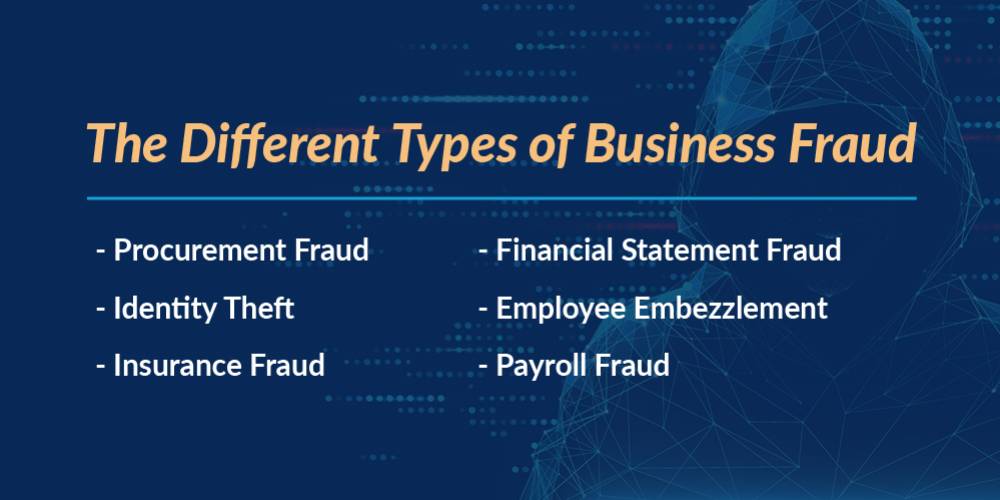Contact Our Firm
The use of the Internet or this form for communication with the firm or any individual member of the firm does not establish an attorney-client relationship. Confidential or time-sensitive information should not be sent through this form.
I have read and understand the Disclaimer and Privacy Policy.

6 Forms of Fraud That May Affect a Business
 When a person or organization makes false statements or representations to obtain money or other benefits, this is known as fraud. While fraud is a criminal offense that can result in prosecution, it also poses a significant threat to businesses, as it can impact their finances, operations, and reputations.
When a person or organization makes false statements or representations to obtain money or other benefits, this is known as fraud. While fraud is a criminal offense that can result in prosecution, it also poses a significant threat to businesses, as it can impact their finances, operations, and reputations.
By understanding the different forms of fraud that could potentially lead to financial losses or other consequences, business owners can take steps to identify and prevent these threats. An experienced attorney can help a business address the legal issues associated with fraud and ensure that a business owner can protect their interests.
The Different Types of Business Fraud
There are many different fraudulent activities that businesses may need to address, including:
Financial Statement Fraud
This form of fraud generally involves intentional misrepresentation or manipulation of a company's financial records or financial position. It can include overstating revenues, understating or hiding liabilities, inflating assets, or altering expense records. The impact of financial statement fraud can be severe, leading to misguided business decisions, loss of investor confidence, and regulatory investigations and penalties. Relying on false data can lead to poor strategic and operational decisions by management who may be unaware of the company’s true financial situation.
Financial statement fraud not only erodes a company's cash flow and profitability, but it also affects employees by causing wage loss and high employee turnover. Once financial statement fraud is exposed, companies may be forced to lay off workers. Additionally, the business faces the burden of investigating the fraud, implementing new controls, and even the possibility of liquidation or bankruptcy.
Employee Embezzlement
In some situations, employees may misuse their positions to steal company funds or assets. Company funds may be drained through schemes like creating fictitious employees or falsifying payment records to vendors. Employee embezzlement can involve skimming cash, manipulating expense reports, and a range of other illegal activities. The financial losses associated with employee embezzlement can be substantial, and the discovery of embezzlement can damage employee morale and trust within the company.
Employee embezzlement can create legal and regulatory problems, lead to higher insurance premiums, cause a decline in employee morale, and, for small businesses, threaten their ability to remain in operation. When news of employee embezzlement becomes public, the company can lose trust from customers, investors, and the general public. Negative publicity can result in embarrassment for the owners and necessitate rebranding efforts.
Payroll Fraud
Schemes such as falsifying timesheets, creating ghost employees, or manipulating payroll records to receive unauthorized payments can also impact a company’s operations by resulting in direct financial losses – sometimes in the hundreds of thousands of dollars. This type of fraud directly impacts a business’s cash flow and can result in significant financial losses and increased labor costs.
Payroll fraud can also result in significant legal and tax penalties, erode trust among employees and customers, damage the company’s reputation, and hinder its ability to attract talent and investment. The discovery and remediation of payroll fraud involves hiring forensic accountants, legal teams, and implementing costly new payroll systems and controls.
Procurement Fraud
Various illegal activities may occur during the purchasing process, including kickbacks, bid rigging, or invoice fraud. This form of fraud can result in inflated costs, substandard products or services, and damaged relationships with suppliers. Procurement fraud undermines the trust between companies and suppliers and can even impact investor confidence.
The direct financial losses for a business involve overpriced contracts, inflated fees, and payments for non-existent goods or services. A company that has experienced procurement fraud will be forced to invest more money in fraud detection, implement new security measures, and strengthen internal controls to prevent future occurrences.
Identity Theft
Fraudsters may steal sensitive information to impersonate a business or its employees. This can lead to unauthorized transactions, data breaches, and a loss of customer trust. A damaged reputation with customers and vendors can lead to loss of business and impact future growth. The financial repercussions can be extensive, and the recovery process is often complex and time-consuming.
The company’s credit score can be damaged, and its operations can be significantly disrupted due to investigation and recovery efforts. Smaller businesses can face complex legal and tax issues resulting from fraudulent filings or data breaches, requiring significant time and resources to resolve.
Insurance Fraud
Insurance fraud typically involves making false insurance claims to receive a payout from the insurance company. Businesses may face increased premiums or denied claims as a result of these fraudulent activities. In some cases, the business may have its insurance policies canceled as a result of the insurance fraud.
This type of fraud can strain a company's finances and complicate future insurance dealings, while also damaging the company’s reputation. Insurance fraud can also result in significant costs for the company, including the expenses of investigating claims and implementing fraud detection systems.

The Impact of Fraud on Business Finances and Operations
Fraud (Florida Statute 817.034) can have a devastating effect on a business, leading to direct financial losses, increased operational costs, and legal expenses. Fraud can also disrupt a business’s operations, damage business relationships, and tarnish a company's reputation. The long-term effects may include a loss of customer trust, decreased employee morale, and reduced investor confidence.
Options Available for Companies Facing Fraud
- Internal controls and audits: Implementing robust internal controls and conducting regular audits can help detect and prevent fraud. These activities may include segregation of duties, thorough background checks during the hiring process, and continuous monitoring of financial transactions.
- Employee training: Educating employees about the types of fraud and how to recognize warning signs can be crucial. Regular training sessions can help create a culture of honesty and vigilance within an organization.
- Whistleblower policies: Encouraging employees to report suspicious activities without fear of retaliation can help uncover fraud early. Establishing a confidential reporting system can be an effective way to facilitate this process.
- Legal action: Businesses affected by fraud should consult with an attorney to explore the potential legal remedies. This may involve civil litigation to recover losses or criminal prosecution of the perpetrators. A lawyer can also assist in implementing measures to prevent future fraud.
- Insurance: Purchasing insurance policies that cover fraud-related losses can mitigate the financial impact. Options may include fidelity bonds, which protect against employee dishonesty, and cyber insurance, which covers data breaches and related cybercrimes.
Contact Our Fort Lauderdale Business Litigation Lawyer for Fraud
If your business has been affected by fraud, it is essential to take immediate action to mitigate the damage and prevent future incidents. Contact our Oakland Park, FL business litigation attorney at The Elliot Legal Group, P.A. to discuss your options and receive guidance on how you can protect your business. Call 754-332-2101 today to schedule a consultation and ensure that your business is safeguarded against fraud.















